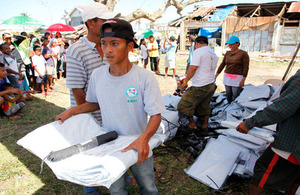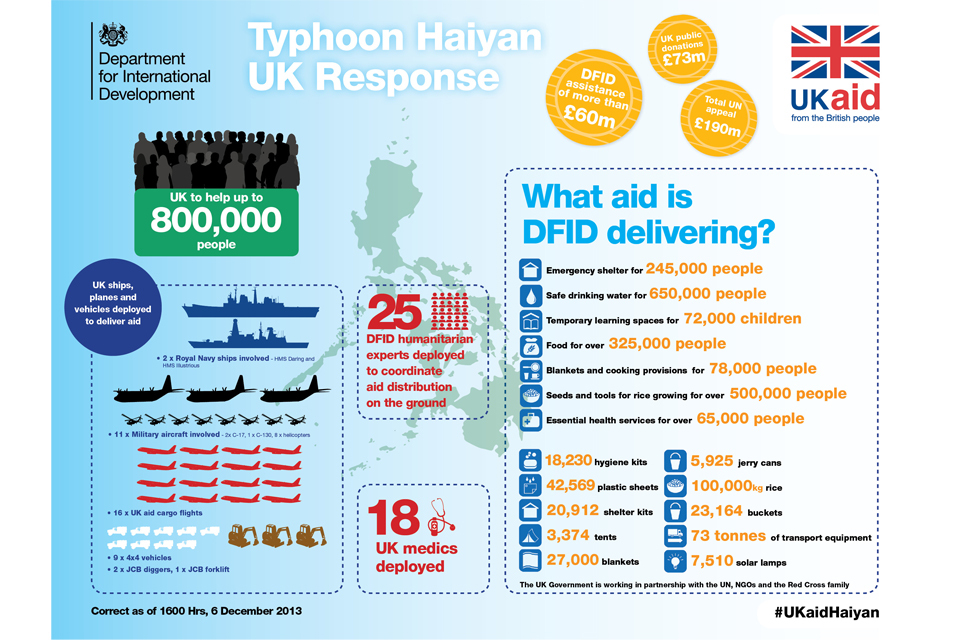Typhoon Haiyan: UK disaster response update
The UK government's humanitarian relief effort includes food, shelter, clean water, medicine and other supplies for up to 800,000 victims.

Lifesaving British aid reaches remote Philippines islands. Picture: Simon Davis/DFID
UK government food, shelter, clean water, medicine and other supplies is reaching up to 800,000 victims of Typhoon Haiyan.
Based on the latest information from the Department for International Development (DFID) field team in the Philippines, released for the first time, the UK government relief efforts has so far delivered the following:
-
eight UK government commercial and military flights have delivered 17,488 shelter kits, 38,569 tarpaulins, 16,230 hygiene kits, 5,925 jerry cans, 9 4x4s and 3 rough-terrain fork-lifts
-
DFID is helping 130,000 people construct emergency shelter, feeding more than 175,000 people, giving 250,000 people clean water or basic hygiene and helping deliver millions of pounds worth of essential medicines
-
the UK’s support to the UN and Red Cross appeals is also delivering vital supplies to more than 500,000 victims of the typhoon and helping teams on the ground to coordinate relief efforts.

Infographic: Typhoon Haiyan UK Response. Credit: HMG
DFID funding, activated through the Rapid Response Facility in the hours immediately following the typhoon, is getting £8 million in emergency aid to be distributed by leading humanitarian charities. This DFID support means:
-
Plan, working with Oxfam and CAFOD, is purifying drinking water and constructing pit latrines for at least 100,000 people. Damaged infrastructure means clean water is in short supply
-
Age International is helping at least 1,000 families to construct shelters, giving 10,000 families food and other items in Leyte and Negros Occidental provinces. Each family is receiving a package of 10kg of rice, canned foods, sugar, coffee, and powered milk as well as blankets, mosquito nets, flashlights and first aid supplies
-
Age International is helping old and vulnerable people in 16 evacuation centres and providing critical psychosocial care for 3,000 vulnerable older people
-
International Health Partners is delivering emergency health kits to the Philippines, as well as bulk shipments of high priority essential medicines. Working with the healthcare industry, they are supplying up to £2 million worth of medical aid, including antibiotics, analgesics and antifungals
-
Christian Aid, working with World Vision, Habitat for Humanity and Map Action, is providing 75,000 people with blankets, rice, beans cooking oil and hygiene kits. They are also providing building materials to help 25,000 people repair their homes and construct shelters
-
CARE, working with Action Against Hunger, Merlin and Save the Children, is setting up health checks to monitor the spread of infectious and chronic diseases such as dysentery and typhoid. Many medical facilities have been badly damaged and have severe staff shortages. The consortium is also giving at least 10,000 people safe drinking water and emergency shelters materials, and 50,000 people essential food supplies
-
Save the Children is providing at least 60,000 people with emergency shelter kits, giving 90,000 people clean water and 10,000 people emergency health kits. They are also helping 500 children to reach lost family members. Save the Children have staff based in Tacloban and Roxas
-
Handicap International is providing 3,000 vulnerable people with emergency shelter and blankets, soap and cooking utensils. They are also providing expert training to other 20 other charities on the round
International Development Secretary Justine Greening said:
The British government is providing vital aid directly to those that need it with the help of charities on the ground. Since the Typhoon hit and we activated the Rapid Response Facility, DFID has helped charities to immediately scale up their response.
On top of this, we have harnessed military assets including cargo planes and logistical equipment to ensure aid not only gets to the Philippines but reaches the neediest people in the most remote parts of the country.
Individual charities will be responsible for delivering relief items and coordinating their response on the ground.
Responding swiftly in humanitarian disasters ensures that more lives are saved and suffering reduced. Established in March 2012, the UK’s Rapid Response Facility is a network of pre-approved specialist aid organisations and private businesses who can rapidly deliver emergency medical, water and sanitation assistance to affected people. It enables the UK government to commit to rapid humanitarian funding to these pre-qualified partners.
Notes to editors
-
The Department for International Development’s infographic on the delivery of UK aid to the Philippines is available on DFID’s Flickr stream
-
The UK is providing more than £50 million in disaster relief for the Philippines. Our humanitarian support will help up to 800,000 people in the wake of Typhoon Haiyan. See here for latest updates: www.gov.uk/government/news/typhoon-haiyan-latest-updates-on-uk-aid.
General media queries (24 hours)
Email mediateam@dfid.gov.uk
Telephone 020 7023 0600
If you have an urgent media query, please email the DFID Media Team on mediateam@dfid.gov.uk in the first instance and we will respond as soon as possible.
Updates to this page
-
Infographic updated
-
First published.